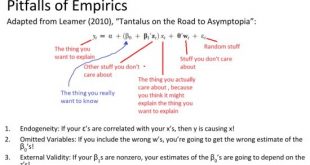from Lars Syll There have been over four decades of econometric research on business cycles … But the significance of the formalization becomes more difficult to identify when it is assessed from the applied perspective … The wide conviction of the superiority of the methods of the science has converted the econometric community largely to a group of fundamentalist guards of mathematical rigour … So much so that the relevance of the research to business cycles is reduced to empirical...
Read More »A “Wild and Dangerous” Scheme!
“…a scheme at once wild and dangerous.” “…a trick, too, of the clumsiest description…” I was hunting for the exact location of “Prince’s Tavern” in Manchester in 1833 when I stumbled upon an Economist article from March 30, 1844 addressing the “practical consequences” of reducing the length of the factory working day from 12 hours to 10. I am always fascinating by the profound and enduring hostility of a faction of employers — amplified by their...
Read More »Chart: The rise of inequality around the world 1980-2018
Source: piketty.pse.ens.fr/ideology.et
Read More »Facts & Values: Distinction or Dichotomy?
from Asad Zaman This continues from the previous post on the Downfall of Rhetoric in 20th Century Even though our goal is to explain how apparently objective looking statistics conceal arbitrary and subjective judgments, the path we take requires a detour through “epistemology”, or the theory of knowledge. Instead of the deep discussion provided by Putnam (2002, Collapse of the Fact/Value Dichotomy), we will take a shortcut, and look at how these philosophical debates and controversies...
Read More »Open thread March 3, 2020
Obamacare With a Public Option: Fool Me Twice Shame on Me
There is an old saying “Fool me once shame on you, fool me twice shame on me.” That saying is relevant for the current healthcare debate in which former Vice-President Biden and elite Democrats are touting a reheated version of Obamacare with a public option. It is a case of trying to fool the American […]
Read More »Econometrics — the scientific illusion of an empirical failure
from Lars Syll Ed Leamer’s Tantalus on the Road to Asymptopia is one of yours truly’s favourite critiques of econometrics, and for the benefit of those who are not versed in the econometric jargon, this handy summary gives the gist of it in plain English: Most work in econometrics and regression analysis is made on the assumption that the researcher has a theoretical model that is ‘true.’ Based on this belief of having a correct specification for an econometric model or running a...
Read More »2 new WEA books
“This stimulating book provides a clear account both of what Modern Monetary Theory entails and of the many objections to it. Its great value is that it will make readers have to think for themselves through many fundamental issues of macro-economic theory and policy.” – Charles Goodhart, London School of Economics Few concepts have attracted more publicity and less conceptual scrutiny as the term ‘complexity’ in economics. Therefore, this volume is a most welcome contribution.” –...
Read More »The coronavirus could wreck the economy. These steps would help limit the damage
from Dean Baker and Jared Bernstein Though we don’t yet know the extent of its threat, a widespread coronavirus epidemic in the United States is increasingly possible. In addition to the downright scary health consequences, we think the virus will quickly do serious damage to the U.S. economy, reducing growth in at least the first half of this year, pushing up unemployment and possibly ending the historically long expansion. And we’re far from alone. The economic challenges posed by...
Read More »Downfall of rhetoric in 20th century
from Asad Zaman One of most effective and powerful among modern forms of rhetoric is the use of statistics to conceal the ancient methods for persuasion. How this is done is the main topic of our essay. In a sequence of posts ( Lies, Damned Lies, and Statistics, Subjectivity Concealed in Index Numbers, The Values of a Market Society, Cross-Country Comparisons of Wealth, and Purchasing Power Parity), I have tried to explain how the statistics we use conceal arbitrary value judgments. This...
Read More » Heterodox
Heterodox




